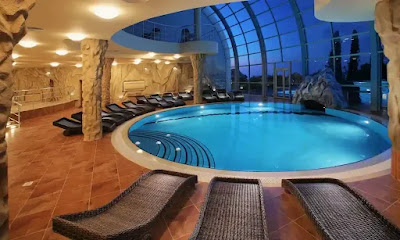The Uber-Rich and Have Their Own Climate Worries
How is a mere billionaire to cope with climate breakdown?
The rich and powerful have sought answers to their angst from Douglas Rushkoff, media theorist, lecturer and author. His most recent book, "Survival of the Richest," draws them to him as a light draws moths.
Rushkoff writes of a meeting with five of the uber-rich seeking his advice. All had their luxury subterranean retreats, pantries larded with everything they would need to hold out for a year, even more. Some even had US Navy Seal alumni on retainer to defend their quarters from the Great Unwashed. There was just one snag.
Finally, the CEO of a brokerage house explained that he had nearly completed building his own underground bunker system, and asked: “How do I maintain authority over my security force after the event?” The event. That was their euphemism for the environmental collapse, social unrest, nuclear explosion, solar storm, unstoppable virus, or malicious computer hack that takes everything down.This single question occupied us for the rest of the hour. They knew armed guards would be required to protect their compounds from raiders as well as angry mobs. One had already secured a dozen Navy Seals to make their way to his compound if he gave them the right cue. But how would he pay the guards once even his crypto was worthless? What would stop the guards from eventually choosing their own leader?
The billionaires considered using special combination locks on the food supply that only they knew. Or making guards wear disciplinary collars of some kind in return for their survival. Or maybe building robots to serve as guards and workers – if that technology could be developed “in time”.
I tried to reason with them. I made pro-social arguments for partnership and solidarity as the best approaches to our collective, long-term challenges. The way to get your guards to exhibit loyalty in the future was to treat them like friends right now, I explained. Don’t just invest in ammo and electric fences, invest in people and relationships. They rolled their eyes at what must have sounded to them like hippy philosophy.
These people once showered the world with madly optimistic business plans for how technology might benefit human society. Now they’ve reduced technological progress to a video game that one of them wins by finding the escape hatch. Will it be Jeff Bezos migrating to space, Thiel to his New Zealand compound, or Mark Zuckerberg to his virtual metaverse? And these catastrophising billionaires are the presumptive winners of the digital economy – the supposed champions of the survival-of-the-fittest business landscape that’s fuelling most of this speculation to begin with.
Just the known unknowns are enough to dash any reasonable hope of survival. But this doesn’t seem to stop wealthy preppers from trying. The New York Times reported that real estate agents specialising in private islands were overwhelmed with inquiries during the Covid-19 pandemic. Prospective clients were even asking about whether there was enough land to do some agriculture in addition to installing a helicopter landing pad. But while a private island may be a good place to wait out a temporary plague, turning it into a self-sufficient, defensible ocean fortress is harder than it sounds. Small islands are utterly dependent on air and sea deliveries for basic staples. Solar panels and water filtration equipment need to be replaced and serviced at regular intervals. The billionaires who reside in such locales are more, not less, dependent on complex supply chains than those of us embedded in industrial civilisation.


I stopped worrying about the future. OK, not 'the' future, but my future.
ReplyDeleteI realized that if my cocoon (ie my savings and gov't CPP/OAS) disappear, so will those of everyone else, including - eventually - the super rich.
The 'event' will be democratizing and legal tender will give way to brute force and perhaps gold.
And I cannot influence events. Pass me a beer, please.
A favourite movie:
Deletehttps://www.imdb.com/title/tt0124298/
Yep
ReplyDeleteThe Jerimiah Johnson Hunger Games Final Destination Squid Games Deluxe Earth Edition
will be a worldwide blockbuster